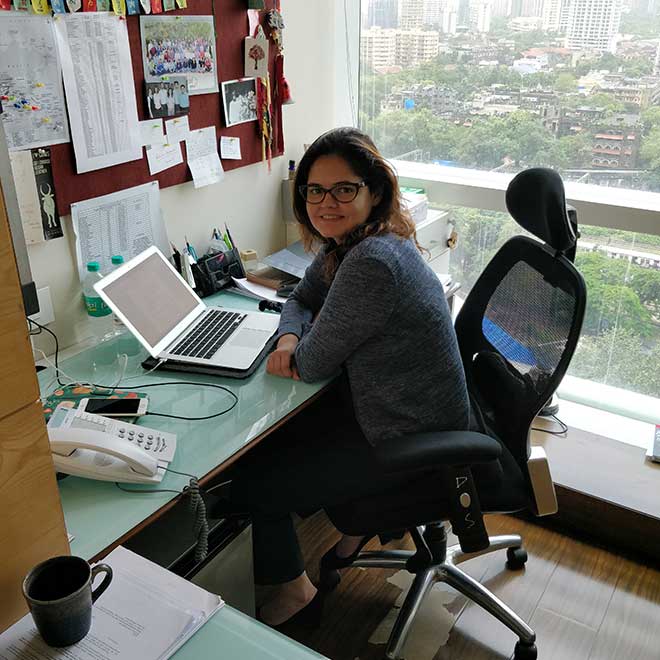Pritha Jha graduated in law from ILS Law College, in 2007. After a successful stint with Desai & Diwanji, she is currently Associate Partner at DSK Legal, where her role entails managing private equity and M&A transactions.
In this interview we speak to her about:
- Her time in ILS Law College
- Her experience in M&A
- Her current role as Associate Partner at DSK
What motivated you to pursue law?
For me, pursuing a career in any field other than law was never really an option, simply because my mind never contemplated being anything else. As far back as I can remember, I have always wanted to be a lawyer. I always enjoyed logical arguments. Being argumentative came naturally to me. While making a career choice, if you have the option, always choose to make a career in what you love doing. You will never fail because you will never be bored and you will never treat what you do as “simply a job”. When you love what you do, its personal.
Could you briefly explain your law school experience at ILS?
When I started studying law in 2002, law wasn’t considered a serious career option, it was actually considered a “last resort”. There were not many who chose law as their “first option”. There was no CLAT and there weren’t as many NLUs around. At the time, ILS was one of the top three universities. There was no disadvantage.
ILS Law made opportunities available to those who wanted it. There were classes, there were moots, there were extracurricular activities, but ILS focuses more on the theory of law rather than on the practical aspect of being “market ready”, especially for a corporate lawyer.
What kind of internships did you undertake during your student years?
I didn’t start interning until my fourth year in law. This is primarily because of the way subjects in law school were spaced out. I didn’t see the point in interning when I hadn’t spent any time studying any law. When I did start interning, it was with various law firms to figure out what interested me most. Some of my internships were with a general corporate team, some with litigation teams and when getting an internship at a law firm was hard, I also interned at an LPO. Securing internships can be difficult, but the focus should really be on practice areas rather than just trying to get a big name on your CV. A lot of students think internships are just about that, getting the name of a firm on your CV without realising that if you make the correct impact as an intern at any firm, you may secure a pre-placement offer. To the contrary, if it appears that you’re just out to have fun, you could also be ensuring you never get picked up, even though your CV looks bright and shiny. Attitude towards work always tells a bigger story than the CV.
What are your areas of specialisation in law?
My specialisation is in mergers, acquisitions and private equity. While I’ve worked in a variety of sectors, of late my focus has been on acquisitions through earn out structures.
I decided what I wanted to do through my internships and through the first years of being an associate. Speaking with people who have spent some time in the profession helps in analysing the pros and cons of the various options available, whether it be litigation, general corporate, private equity, mergers and acquisitions, taking a position in house, there are lots of options. Every individual needs to understand that they will never have everything they want. You need to decide before hand what your priorities are and what will fit your working style best. Ultimately, people will stick with what makes them happy. That’s how it worked out for me.
What level of importance needs to be attached to GPAs, in light of the other academic and non-academic activities that may be undertaken in law school?
I will not deny that grades are important in giving an individual their first break. But topping your class is not going to help if you do not possess other attributes. Individuals are judged on various levels, their academics, their ability to speak and write English, the way they present themselves, their interests outside of law, everything counts. Rather than focusing on one aspect, one needs to focus on trying to achieve a balance in all. Everything adds to an individual’s personality.
Is an L.L.M absolutely necessary for a career in law?
In my view, an LLM is a good option if your choice of career in law is teaching. From my perspective, an LLM does not really add to what you know after having obtained an LLB. However, an LLM can teach a great deal of things if you choose to pursue it after having gained a few years of practical experience. You relate to the LLM program more and you pick up a few other skills that law school may not have taught you or may not have prepared you for. For example, writing a research paper teaches the mind to think things through methodically, presentations help individuals develop the confidence to speak before large groups of individuals, some courses will also teach business development skills. It depends on each individual and their needs. Lots of LLM programs are offered around the world. If you must, choose from one that helps you achieve your goal. A lot of people join the LLM program for the wrong reasons, sometimes not knowing what they expect to achieve from it. If you don’t know why you’re doing it, don’t do it. Having said all this, is an LLM necessary? Absolutely not.
When and why did you decide to make the transition from Desai & Diwanji to DSK Legal?
I made my move to DSK Legal after having spent about two and a half years at Desai & Diwanji. Having spent that time there, I felt like I needed a change because my abilities were not being exploited to their full potential. Being an ambitious individual, I needed to do more and needed to do it more quickly. Added to that, the immediate partner that I worked with back then moved to the United States, and at the time, I was quite emotional about his departure.

Tell us about your current work profile with DSK Legal. What does a regular work day look like, for you?
I am an Associate Partner and I specialise in mergers and acquisitions and private equity. Over the last few years I have specialised particularly in mergers and acquisitions in earn out deals in the advertising space. Having recently been appointed associate partner, it’s a shift in focus from delivering work to focusing on delivering and getting new work. It’s a challenging job profile for me.
I really wish there was something like a regular work day at DSK Legal. There simply isn’t one. Some days are astoundingly fast, some days are excruciatingly slow and then there are days that are just never ending. However, I assure you, it’s never boring.
What is your message to our readers?
My message to any young individual aiming to be good lawyers is that their first priority should be on picking up the skills that are required to be a good lawyer. The first few years of being a professional lawyer is all about making sacrifices and learning how to be a great lawyer. It takes a great deal of commitment, and although sacrificing at every turn may not feel the best at the time, it reaps huge rewards in the long run. Work very hard and nothing will stand in your way. Money never comes before hard work, money is a consequence of it. You have to earn it. If you’re good at what you do, you will never need to chase money.


























